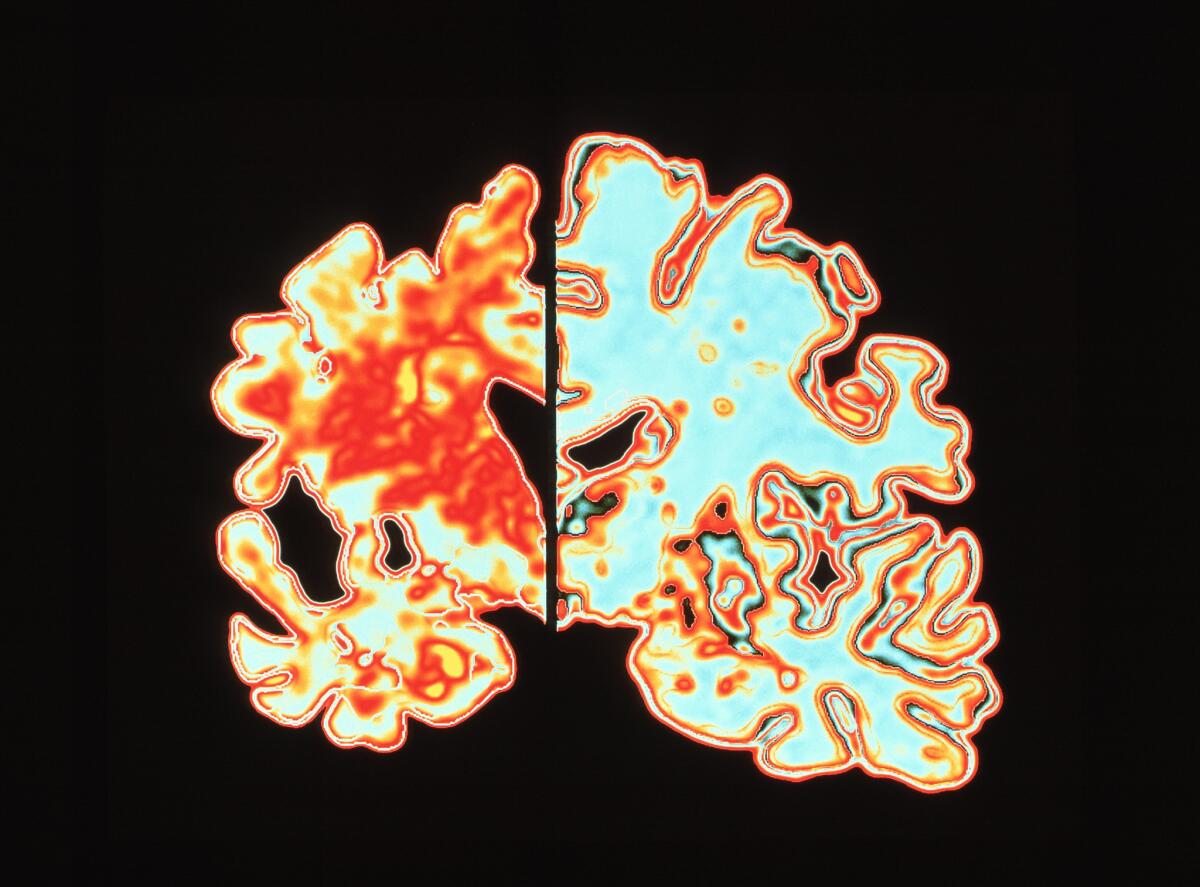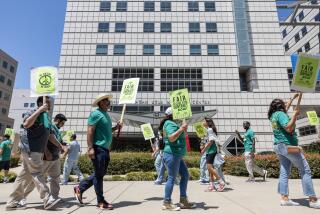UC San Diego sues USC and scientist, alleging conspiracy to take funding, data

An ultrasound comparison of a brain of a patient with Alzheimer’s disease, left, and a normal brain, right.
UC San Diego has sued USC and a nationally recognized Alzheimer’s disease researcher, alleging that they illegally conspired to take federal funding, data and employees from a UC San Diego study center on the illness.
The lawsuit, filed in San Diego County Superior Court, charges that scientist Paul Aisen and eight colleagues illegally conspired to take research data and other assets with them when they moved from UC San Diego to USC, allegedly seeking to supplant their former center. Aisen left UC San Diego last month to head a new Alzheimer’s institute founded by USC in San Diego, bringing the eight staffers with him.
Though universities commonly recruit or poach faculty from one another, lawsuits arising from those recruitments are rare. This lawsuit, formally filed by the UC regents, accuses USC and the other defendants of going beyond normal recruitment to commit a variety of illegal acts, including contract interference, computer crimes and civil conspiracy.
UC San Diego said it has been deprived of access to data from the Alzheimer’s project because of violations by Aisen and the other defendants and potentially could lose hundreds of millions of dollars in federal and private funding. The University of California is seeking an unspecified amount of money, to be determined through a jury trial.
USC denied wrongdoing and said it simply recruited a prestigious scientist, an activity that academic institutions routinely perform.
“We are surprised and disappointed that the University of California San Diego elected to sue its departing faculty member and his team, as well as USC, rather than manage this transition collaboratively, as is the well-accepted custom and practice in academia,” USC said in a statement.
Aisen did not provide a comment about the lawsuit and its allegations, acknowledging in an email only that he had received an interview request.
Aisen is best known for leading the Alzheimer’s Disease Cooperative Study, or ADCS, a nationwide effort to speed up getting promising Alzheimer’s treatments to patients. Funded by the National Institute on Aging, the study has been based at UC San Diego since its creation in 1991. Aisen became its head in 2007.
In 2013, the National Institute on Aging announced a five-year grant of up to $55 million for the study. Total funding for ADCS from government and private sources is roughly $100 million, according to the lawsuit.
Among its projects, the study is leading a large clinical trial of an Alzheimer’s drug, involving about 1,000 participants.
Beyond academic prestige and funding, the broader stakes underpinning UC San Diego’s lawsuit are immense. Alzheimer’s disease is among the top 10 causes of death in the United States and the direct costs of Alzheimer’s care will total about $226 billion, according to the Alzheimer’s Assn.
When Aisen resigned from UC San Diego on June 21, that university declined to let him keep the associated government funding. UC San Diego has named two other Alzheimer’s researchers to lead the study while it seeks a permanent replacement for Aisen. On June 25, USC announced it had hired Aisen to lead its new Alzheimer’s research center in San Diego, presumably a rival to the UC center.
The UC lawsuit alleges that while Aisen and some of his colleagues were still employed by UC, they conspired to transfer the study from UC San Diego to USC and made false or misleading statements to the Alzheimer’s study employees to get them to move to the new USC institute. They also didn’t obtain consent from the major funder, the National Institute on Aging, UC San Diego asserts.
The National Institute on Aging has confirmed that its grant still belongs to UC San Diego, not Aisen or USC.
USC encouraged Aisen by granting him generous terms, including a $500,000 annual salary guaranteed through 2020, the lawsuit said. And with the expectation that the salary would come from outside research funding, Aisen had “a strong personal financial incentive to interfere” with UC’s contracts with research sponsors, according to the suit.
Aisen and the other defendants also took unauthorized control of the Alzheimer’s study data, the UC lawsuit said. They allegedly placed the data in an Amazon account not under UC San Diego’s control and have not responded to UC’s requests for the password to that account, UC contends.
Pradeep Khosla, UC San Diego’s chancellor, said the university is protecting its efforts in Alzheimer’s research.
“We are proud of our work, grateful for our partners and disappointed that one faculty member has chosen to separate in such a way that puts the ADCS’ work in jeopardy,” Khosla wrote in a statement.
The lawsuit highlights the rivalry and ill will between USC and some in the San Diego academic community.
USC made a bid last year to partner with or acquire the Scripps Research Institute, an independent biomedical organization in La Jolla that is home to Nobel Prize-winning scientists and has helped produce important drugs to treat rheumatoid arthritis and lupus. Intense faculty opposition scuttled that bid. UC San Diego’s Khosla suggested the his university would make a better partner than USC.
USC has been using its fundraising prowess to help recruit top-level faculty from other universities. Among such moves, USC in 2013 hired away two top neuroscientists from UCLA, Arthur Toga and Paul Thompson, and nearly all the staff from their UCLA laboratory moved with them.
In its current capital campaign, USC has raised more than $4 billion in its goal to garner $6 billion by 2018. Meanwhile, UC San Diego is preparing to raise about $2 billion with its own capital campaign.
Twitter: @sandiegoscience
More to Read
Sign up for Essential California
The most important California stories and recommendations in your inbox every morning.
You may occasionally receive promotional content from the Los Angeles Times.









